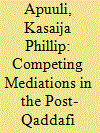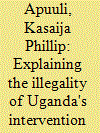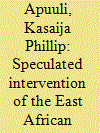|
|
|
Sort Order |
|
|
|
Items / Page
|
|
|
|
|
|
|
| Srl | Item |
| 1 |
ID:
183954


|
|
|
|
|
| Summary/Abstract |
Since the end of the revolution that toppled the rule of Muammar Qaddafi in October 2011, Libya has never known peace. The country descended into civil war with different factions contending for control. In this milieu, the United Nations attempted to mediate an end to the crisis but its efforts have failed to gain traction partly as a result of other mediation initiatives undertaken by several European actors. Sub-regional and continental organizations, including the Arab Maghreb Union (AMU) and the African Union (AU) respectively, that should have taken the lead in the mediation have been absent. Meanwhile, continued fighting has hampered a mediated settlement, and terrorist groups such as the Islamic State (IS) and al-Qaeda have taken advantage of the situation to establish a presence in the country. In the end, rather than ending the crisis, Libya has provided the ground for competing mediation processes which have prolonged the crisis.
|
|
|
|
|
|
|
|
|
|
|
|
|
|
|
|
| 2 |
ID:
135232


|
|
|
|
|
| Summary/Abstract |
During the night of 15 December 2013, fighting broke out between factions of the Sudan People's Liberation Army (SPLA) in Juba, the capital of the Republic of South Sudan. The fighting pitted forces loyal to President Salva Kiir against those loyal to former Vice President Riek Machar. Five days later, Uganda sent troops into South Sudan, advancing a number of reasons for intervention, including that it had been invited by the legitimate government of South Sudan to ensure order; it needed to evacuate Ugandan citizens caught up in the fighting; it had been asked by the United Nations Secretary-General to intervene; and that the regional organisation, the Intergovernmental Authority on Development had sanctioned the intervention. As the conflict escalated, Ugandan troops started fighting on the side of forces loyal to Kiir. The underlying reasons for the intervention were clearly economic, but those advanced were legal. This article discusses both sets of reasons and concludes that the economic reasons are more persuasive. Nevertheless, while some of the legal arguments (such as being invited by the legitimate government of South Sudan) can be asserted, others are clearly dubious. In addition, the participation of Ugandan troops in the fighting on the side of the Kiir government renders the intervention illegal.
|
|
|
|
|
|
|
|
|
|
|
|
|
|
|
|
| 3 |
ID:
107327


|
|
|
|
|
| Publication |
2011.
|
| Summary/Abstract |
The election of Sheik Sharif Sheik Ahmed as the transitional president of Somalia was the climax of the United Nations (UN)-led Djibouti peace process. The election, it was hoped, would herald the beginning of the reconstitution of the Somalian state. Unfortunately, nearly three years after the event, that has still not happened. The government of Sheik Sharif has faced a number of challenges which are yet to be resolved. In the end, the Djibouti peace process has not guaranteed a stable and functional national government in Somalia.
|
|
|
|
|
|
|
|
|
|
|
|
|
|
|
|
| 4 |
ID:
172097


|
|
|
|
|
| Summary/Abstract |
As the crisis in the Sudan unfolded after the overthrow of long time President Omar al-Bashir, the Director of the East African Standby Force (EASF) purportedly made a statement to the effect that the force was ready to intervene should the situation become genocidal. Using the case of its failed intervention in Burundi crisis, this article argues that the EASF deployment in the Sudan would generally not be feasible for reasons including: the government of the Sudan would not consent to the intervention; the ongoing dialogue between the warring parties would preclude any intervention; and the lack of capacity of the force to actually deploy. From its failed deployment in Burundi, these lessons can be discerned: first, that for any deployment of the EASF to be authorised, the policy organs especially of the AU must be aligned in their understanding of the situation. Secondly, where there are alternative means of dealing with the situation, military intervention would not be authorised. Lastly, that consent of the host state must be procured before deployment is undertaken out of respect for the principle of sovereignty.
|
|
|
|
|
|
|
|
|
|
|
|
|
|
|
|
|
|
|
|
|